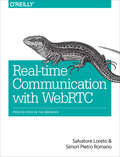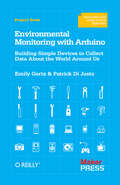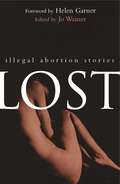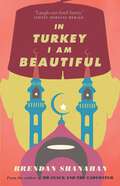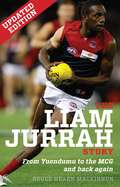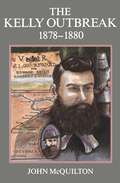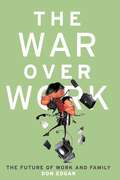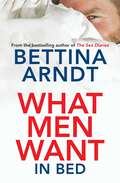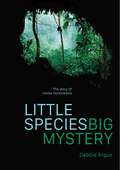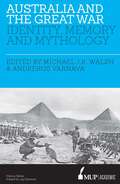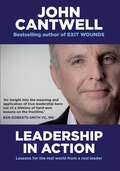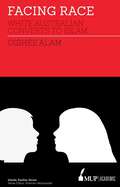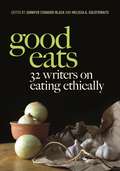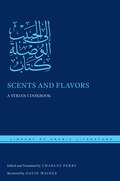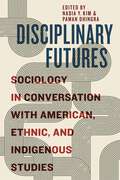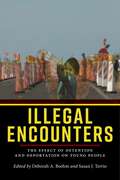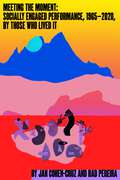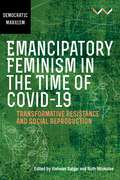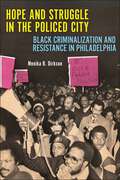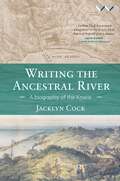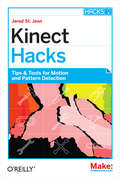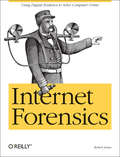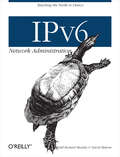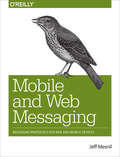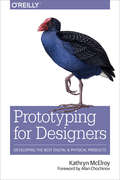- Table View
- List View
Real-Time Communication with WebRTC: Peer-to-Peer in the Browser
by Salvatore Loreto Simon Pietro RomanoDeliver rich audio and video real-time communication and peer-to-peer data exchange right in the browser, without the need for proprietary plug-ins. This concise hands-on guide shows you how to use the emerging Web Real-Time Communication (WebRTC) technology to build a browser-to-browser application, piece by piece.The authors’ learn-by-example approach is perfect for web programmers looking to understand real-time communication, and telecommunications architects unfamiliar with HTML5 and JavaScript-based client-server web programming. You’ll use a ten-step recipe to create a complete WebRTC system, with exercises that you can apply to your own projects.Tour the WebRTC development cycle and trapezoid architectural modelUnderstand how and why VoIP is shifting from standalone functionality to a browser componentUse mechanisms that let client-side web apps interact with browsers through the WebRTC APITransfer streaming data between browser peers with the RTCPeerConnection APICreate a signaling channel between peers for setting up a WebRTC sessionPut everything together to create a basic WebRTC system from scratchLearn about conferencing, authorization, and other advanced WebRTC features
Environmental Monitoring with Arduino: Building Simple Devices to Collect Data About the World Around Us
by Emily Gertz Patrick Di JustoAfter the devastating tsunami in 2011, DYIers in Japan built their own devices to detect radiation levels, then posted their finding on the Internet. Right now, thousands of people worldwide are tracking environmental conditions with monitoring devices they’ve built themselves. You can do it too!This inspiring guide shows you how to use Arduino to create gadgets for measuring noise, weather, electromagnetic interference (EMI), water purity, and more. You’ll also learn how to collect and share your own data, and you can experiment by creating your own variations of the gadgets covered in the book. If you’re new to DIY electronics, the first chapter offers a primer on electronic circuits and Arduino programming.Use a special microphone and amplifier to build a reliable noise monitorCreate a gadget to detect energy vampires: devices that use electricity when they’re “off”Examine water purity with a water conductivity deviceMeasure weather basics such as temperature, humidity, and dew pointBuild your own Geiger counter to gauge background radiationExtend Arduino with an Ethernet shield—and put your data on the InternetShare your weather and radiation data online through Pachube
Lost: Illegal Abortion Stories
by Jo Wainer'It is chastening to read these bald tales, shockingly direct and unvarnished. Each story contains matter enough for a novel. Each one is a window onto a larger life, a broader world: a tantalising view of endlessly unfolding complexities.'-Helen Garner Twenty years ago, Dr Bertram Wainer, the abortion reform doctor and campaigner, placed an advertisement in a newspaper asking women who had illegal abortions to come forward to tell their stories. Their personal testimonies and the accounts from doctors and nurses are published for the first time in this collection. Women had to draw on deep reservoirs of courage and determination faced with the fear of illegal abortion. This collection tells of some of those acts of courage and the difficulties society placed in women's way. Moving and candid, these stories uncover the hidden history of abortion in Australia.
In Turkey I am Beautiful
by Brendan ShanahanTwo years after his first visit, travel writer Brendan Shanahan returned to Turkey. After catching up with old friends in Istanbul, he set off on a journey in the country's secretive east where, among other adventures, he found himself in the middle of a gunfight, was propositioned by a gang of teenage boys and swam to Armenia in his underpants. Returning to Istanbul, Brendan agreed to run a friend's carpet shop. With only the dubious help of a loveable but wildly unstable drug addict, the results were occasionally disastrous, frequently hilarious and often poignant.
Liam Jurrah Story: From Yuendumu to the MCG and back again: Updated Edition
by Bruce Hearn MackinnonKnown as the 'Warlpiri Warrior,' the 'Jurrahcane' and 'Cougar,' one time Melbourne AFL footballer Liam Jurrah made his mark with startling displays of skill, artistry and the 'deadly' impact of his football ability. This book tells the extraordinary cultural journey travelled by Liam, a fully initiated Warlpiri man, from the remote Aboriginal desert community of Yuendumu to the MCG, as the first of his kind to play football at an elite level. Combating language and cultural hurdles along the way, Liam became not just an AFL player, but an instant star of the game. This updated edition tells Liam's remarkable story and explains the reasons for his tragic fall from grace, his departure from the game, his troubles with the law, his time in jail and his return to his home of Yuendumu, where it all began. Told by Bruce Hearn Mackinnon, whose family provided a home for Liam when he first moved to Melbourne, it's the story of Liam's time at Collingwood and Melbourne football clubs and an intimate insight into the richness of Liam's Warlpiri culture and an inspiration for those who might follow his lead.
Kelly Outbreak 1878-1880: The Geographical Dimension of Social Banditry
by John McQuiltonThis book examines the Kelly Outbreak against its geographical and social background. Failure to unlock the land through selection had created a class of struggling selectors who felt that the established authority of squatters and police denied them justice. Their sympathy and support helped Ned come and go as he pleased, despite the price on his head. McQuilton's exciting narrative maintains suspense, and his unobtrusive scholarship fills in the details and corrects many errors whch the Kelly myth has accumulated over the years.
War Over Work: The Future of Work and Family
by Don EdgarMany workers are caught in a spiral of longer hours, growing job insecurity, work stress and family conflict. Many want to spend more time with their family but fear being labelled uncommitted. The War Over Work is a bold and authoritative account of work patterns and the labour market in Australia. As Edgar sees it, the future workplace is a battleground, with struggles between corporate need and private greed, unions and employers, men and women, old and young. The re-election of the Howard Government promises to make these battles even more contested. In this accessible and engaging book Edgar argues that we cannot continue to focus narrowly on 'the work-family balance' as though it can be achieved through simple programs within individual Australian workplaces. The War Over Work provides a blueprint for how we can win the war to get a life that works. Dr Don Edgar is a sociologist and influential public commentator. He was foundation Director (for 14 years) of the Australian Institute of Family Studies. Since then he has directed the innovative New Links Workplace Project and acted as consultant to governments and business on work-family policies and programs. His publications include Men, Mateship, Marriage and The Patchwork Nation: Rethinking Government, Rebuilding Community.
What Men Want: In Bed
by Bettina ArndtAcross the world, the story is the same. Sex scandal. Media frenzy. Another prominent man caught with his pants down. So why do men take such risks for sex? Sex therapist Bettina Arndt's new book is all about why sex matters so much to men. More than 150 men kept diaries for her, talking about what it is like to live with that constant sparking sexual energy—relentless, uncontrollable, all-consuming. Their painfully honest, confronting, often hilarious stories explain their quest for sexual adventure, their secret delights, the thrill of giving pleasure, why some men turn to pornography and men's delight in the Viagra revolution. With every second man over fifty dealing with erection problems, Bettina offers advice on the wondrous new treatments giving men a new lease of sexual life. Her diarists reveal what it is like to pop little blue pills, or inject their best friend, or face impotence after prostate cancer treatments, or use treatments with a reluctant partner. What Men Want: In Bed lifts the lid on men's longings, frustrations, their fears and their intense joy in making love.
Little Species, Big Mystery: The Story of Homo Floresiensis
by Debbie ArgueThere is only one kind of human on earth today: us. But we are only one of a number of human species - primates of the Hominini tribe - that have existed on our planet across the millennia. In 2004 the world was astounded by the discovery of Homo floresiensis, a species of human never encountered before, on the island of Flores in the Indonesian archipelago. A very short, thickset being, with long arms and feet and an appetite for stegodons (a now extinct relative of modern elephants), it was soon nicknamed 'the hobbit'. As recently as 52,500 years ago, at a time when our own ancestors were spreading around the world, these 'hobbit' cousins lived also, at least on Flores. In Little Species, Big Mystery archaeologist Debbie Argue takes us on a journey of thrilling scientific discovery, recounting the unearthing of H. floresiensis, the archaeological expeditions that have followed, other finds - including that of a small Philippines hominin - and new paths of research and discussion. Argue conveys the excitement of searching for and finding clues to a lost past, and the animated discussions that have flowed from their discovery. She provides much contextual information to strengthen our grasp of the essential coordinates of this field and stimulate our interest in the shadowy, fascinating realm of prerecorded time.
Australia and the Great War: Identity, Memory and Mythology
by Andrekos Varnava Michael Jk WalshAustralia and the Great War explores both the immediate and long-term consequences of the war on this complex relationship, looking in particular at identity, history, gender, propaganda, economics and nationalism.This multidisciplinary collection of essays unveils the creation and subsequent [mis]use of histories and mythologies while considering the necessity and nature of both remembering, and forgetting, war.
Leadership in Action
by Major General John CantwellLeadership is about emotions, it is about trust, it is about being authentic. John Cantwell knows this from his almost forty years of leading men and women in peace and war, through successes and in tough times as he rose through the ranks from private to general in the Australian Army. Filled with specific guidance and tips for leaders, Leadership in Action takes the reader on a journey through the essential skills that great leaders use to build loyalty, teamwork, decisiveness and dozens of other vital outcomes. Written in Cantwell's engaging style, Leadership in Action reveals a framework of highly effective leadership techniques that work in any situation.
Facing Race: White Australian Converts to Islam
by Oishee AlamThe figure of 'the Muslim' is constructed by both Muslim and non-Muslim Australians as incongruent with whiteness, but what of white Muslim converts, who are at once highly racialised and racially invisible? Facing Race explores the lived experiences of thirty-six Australian converts to Islam, in a nation where Islam is cast in opposition to the dominant racial narrative of whiteness that informs the nation's core ideology. Drawing on in-depth interviews, author Oishee Alam provides a fascinating account of how racialisation is reproduced in everyday interpersonal encounters by white converts, with Muslims and non-Muslims alike - and what those experiences reveal to us about race, Islamophobia and whiteness in contemporary Australia. Islamic Studies Series - Volume 26
Good Eats: 32 Writers on Eating Ethically
by Melissa A. Goldthwaite Jennifer Cognard-BlackA collection of insightful and personal essays on the role of food in our livesIn an age of mass factory farming, processed and pre-packaged meals, and unprecedented food waste, how does one eat ethically?Featuring a highly diverse ensemble of award-winning writers, chefs, farmers, activists, educators, and journalists, Good Eats invites readers to think about what it means to eat according to individual and collective values. These essays are not lectures about what you should eat, nor an advertisement for the latest diet. Instead, the contributors tell stories of real people—real bellies, real bodies—including the writers themselves, who seek to understand the experiences, cultures, histories, and systems that have shaped their eating and their ethics.A wide array of themes, topics, and perspectives inform the selections within Good Eats, contributing to an enhanced understanding of how we eat as individuals and in groups. From factory farming and the exploitative labor practices surrounding chocolate production, to Indigenous foodways and home and community gardens, the topics featured in this collection describe the wider context of sustenance and ethical choices. Good Eats will encourage you to become more mindful of what and how you eat—and to consider the larger systems and cultures that shape that eating. These essays turn mundane meals into remarkable symbols of how we live, encouraging each of us to find food that is both sustaining and sustainable. Contributors include Ross Gay, DeLyssa Begay, Lynn Z. Bloom, Michael P. Branch, Nikky Finney, Shirley Geok-lin Lim, Barbara J. King, Aimee Nezhukumatathil, Leah Penniman, Adrienne Su, Ira Sukrungruang, Tina Vasquez, Nicole Walker, Thérèse Nelson, Lisa Knopp, Jane Brox, Maureen Stanton, Taté Walker, and many others.
Scents and Flavors: A Syrian Cookbook (Library of Arabic Literature #47)
by Charles PerryCollecting 635 meticulous recipes, Scents and Flavors invites us to savor an inventive cuisine that elevates simple ingredients by combining the sundry aromas of herbs, spices, fruits, and flower essences. This popular thirteenth-century Syrian cookbook is an ode to what its anonymous author calls the “greater part of the pleasure of this life,” namely the consumption of food and drink, as well as the fragrances that garnish the meals and the diners who enjoy them. Organized like a meal, it opens with appetizers and juices and proceeds through main courses, side dishes, and desserts, including such confections as candies based on the higher densities of sugar syrup—an innovation unique to the medieval Arab world. Apricot beverages, stuffed eggplant, pistachio chicken, coriander stew, melon crepes, and almond pudding are seasoned with nutmeg, rose, cloves, saffron, and the occasional rare ingredient like ambergris to delight and surprise the banqueter. Bookended by chapters on preparatory perfumes, incenses, medicinal oils, antiperspirant powders, and after-meal hand soaps, this comprehensive culinary journey is a feast for all the senses. With the exception of four extant Babylonian and Roman specimens, cookbooks did not appear on the world literary scene until Arabic speakers began compiling their recipe collections in the tenth century, peaking in popularity in the thirteenth century. Scents and Flavors quickly became a bestseller during this golden age of cookbooks, and remains today a delectable read for epicures and cultural historians alike.A bilingual Arabic-English edition.
Disciplinary Futures: Sociology in Conversation with American, Ethnic, and Indigenous Studies
by Pawan Dhingra Nadia Y. KimReimagines how race, ethnicity, imperialism, and colonialism can be central to social science researchand methodsThere is a growing consensus that the discipline of sociology and the social sciences broadly need to engage more thoroughly with the legacy and the present day of colonialism, Indigenous/settler colonialism, imperialism, and racial capitalism in the United States and globally. In Disciplinary Futures, a cross-section of scholars comes together to engage sociology and the social sciences by way of these paradigms, particularly from the influence of disciplines of American, Ethnic, and Indigenous Studies.With original essays from scholars such as Yến Lê Espiritu, Sunaina Maira, Hōkūlani K. Aikau, Salvador Vidal-Ortiz, Ben Carrington, Yvonne Sherwood, and Gilda L. Ochoa, among others, Disciplinary Futures offers concrete pathways for how the social sciences can expand from the limiting frameworks they traditionally use to study race and racism, namely: the black-white binary, the privileging of the nation-state, the fixation on the US mainland, the underappreciation of post- and settler-colonial studies, the liberal assumptions, and the limited conception of what constitutes data. In turn, the contributors reveal that sociology has many useful questions, methodologies, and approaches to offer scholars of American, Ethnic, and Indigenous Studies. Disciplinary Futuresis an important work, one which renders these disciplines more intellectually expansive and thus better able to tackle urgent issues of injustice.
Illegal Encounters: The Effect of Detention and Deportation on Young People
by Susan J. Terrio Deborah A. BoehmThe impact of the U.S. immigration and legal systems on children and youth In the United States, millions of children are undocumented migrants or have family members who came to the country without authorization. The unique challenges with which these children and youth must cope demand special attention. Illegal Encounters considers illegality, deportability, and deportation in the lives of young people—those who migrate as well as those who are affected by the migration of others. A primary focus of the volume is to understand how children and youth encounter, move through, or are outside of a range of legal processes, including border enforcement, immigration detention, federal custody, courts, and state processes of categorization. Even if young people do not directly interact with state immigration systems—because they are U.S. citizens or have avoided detention—they are nonetheless deeply affected by the reach of the government in its many forms.Contributors privilege the voices and everyday experiences of immigrant children and youth themselves. By combining different perspectives from advocates, service providers, attorneys, researchers, and young immigrants, the volume presents rich accounts that can contribute to informed debates and policy reforms. Illegal Encounters sheds light on the unique ways in which policies, laws, and legal categories shape so much of daily life for young immigrants. The book makes visible the burdens, hopes, and potential of a population of young people and their families who have been largely hidden from public view and are currently under siege, following their movement through complicated immigration systems and institutions in the United States.
Meeting the Moment: Socially Engaged Performance, 1965–2020, by Those Who Lived It
by Jan Cohen-Cruz Rad PereiraThe experiences of a diverse range of progressive theater and performance makers in their own words.Curated stories from over 75 interviews and informal exchanges offer insight into the field and point out limitations due to discrimination and unequal opportunity for performance artists in the United States over the past 55 years. In this work, performers, often unknown beyond their immediate audience, articulate diverse influences. They also reflect on how artists are educated and supported, what content is deemed valuable and how it is brought to bear, as well as which audiences are welcome and whether cross-community exchange is encouraged. The book’s voices bring the reader from 1965 through the first wave of the covid-19 pandemic in 2020. They point to more diverse and inclusive practices and give hope for the future of the art.
Emancipatory Feminism in the Time of Covid-19: Transformative resistance and social reproduction (Democratic Marxisms)
by Vishwas Satgar Christine Bischoff Jacklyn Cock Ruth Ntlokotse Hawzhin Azeez Asanda Benya Jane Cherry Samantha Hargreaves Inge Konik Jane Mbithi-Dikgol Courtney Morgan Sonia Phalatse Busi Sibeko Dineo SkosanaThe Covid-19 pandemic showed that a patriarchal capitalist socio-economic system is unable to address the socio-ecological reproduction need of societies. This volume foregrounds the possibilities emancipatory feminism creates by resisting neo-liberalism through grassroots and indigenous activism.The Covid-19 pandemic threw into stark relief the multi-dimensional threats created by neoliberal capitalism. Government measures to alleviate the crisis were largely inadequate, leaving women – in particular working-class women – to carry the increased burden of care work while at the same time placing themselves in direct risk as frontline workers.Emancipatory Feminism in the Time of Covid-19, the seventh volume in the Democratic Marxism series, explores how many subaltern women – working class, peasant and indigenous –challenge hegemonic neoliberal feminism through their resistance to ordinary capitalist practices and ecological extractivism. Contributors cover women’s responses in a wide range of contexts: from women leading the defence of Rojava – the Kurdish region of Syria, to approaches to anti-capitalist ecology and building food secure pathways in communities across Africa, to championing climate justice in mining affected communities and transforming gender divisions in mining labour practices in South Africa, to contesting macro-economic policies affecting the working conditions of nurses. Their practices demonstrate a feminist understanding of the current systemic crises of capitalism and patriarchal oppression. What is offered in this collection is a subaltern women’s grassroots resistance focused on advancing and enabling solidarity-based political projects, deepening democracy, building capacities and alliances to advance new feminist alternatives.
Hope and Struggle in the Policed City: Black Criminalization and Resistance in Philadelphia
by Menika B. DirksonExplores how concerns about poverty-induced Black crime cultivated by police, journalists, and city officials sparked a rise in tough-on-crime policing in PhiladelphiaDuring the Great Migration of African Americans to the North, Philadelphia’s police department, journalists, and city officials used news media to create and reinforce narratives that criminalized Black people and led to police brutality, segregation, and other dehumanizing consequences for Black communities. Over time, city officials developed a system of racial capitalism in which City Council financially divested from social welfare programs and instead invested in the police department, promoting a “tough on crime” policing program that generated wealth for Philadelphia’s tax base in an attempt to halt white flight from the city.Drawing from newspapers, census records, oral histories, interviews, police investigation reports, housing project pamphlets, maps, and more, Hope and Struggle in the Policed City draws the connective line between the racial bias African Americans faced as they sought opportunity in the North and the over-policing of their communities, of which the effects are still visible today. Menika B. Dirkson posits that the tough-on-crime framework of this time embedded itself within every aspect of society, leading to enduring systemic issues of hyper-surveillance, the use of excessive force, and mass incarceration.Hope and Struggle in the Policed City makes important contributions to our understanding of how a city government’s budgetary strategy can function as racial capitalism that relies on criminal scapegoating. Most cogently, it illustrates how this perpetuates the cycle of poverty-induced crime, inflates rates of incarceration and police brutality, and marginalizes poor people of color.
Writing the Ancestral River: A biography of the Kowie
by Jacklyn CockWriting the Ancestral River is an illuminating and unusual biography of the Kowie River in the Eastern CapeThis tidal river runs through the centre of what used to be called the Zuurveld, a formative meeting ground of different peoples who have shaped our history: Khoikhoi herders, Xhosa pastoralists, Dutch trekboers and British settlers. Their direct descendants continue to live in the area and interact in ways that have been decisively shaped by their shared history. Besides being a social history, this is also a natural history of the river and its catchment area, where dinosaurs once roamed and cycads still grow. As the book shows, the natural world of the Kowie has felt the effects of human settlement, most strikingly through the establishment of a harbour at the mouth of the river in the 19th century and the development of a marina in the late 20th century. Both projects have had a decisive and deleterious impact on the Kowie. People are increasingly reconnecting with nature and justice through rivers. Acknowledging the past, and the inter-generational, racialised privileges, damages and denials it established and perpetuates, is necessary for any shared future. By focusing on this `little' river, the book raises larger questions about colonialism, capitalism, `development' and ecology, and asks us to consider the connections between social and environmental injustice.
Kinect Hacks: Tips & Tools for Motion and Pattern Detection
by Jared St. JeanCreate your own innovative applications in computer vision, game design, music, robotics, and other areas by taking full advantage of Kinect’s extensive interactive, multi-media platform. With this book, you get a step-by-step walkthrough of the best techniques and tools to come out of the OpenKinect project, the largest and most active Kinect hacking community.Learn dozens of hacks for building interfaces that respond to body movements, gestures, and voice, using open source toolkits such as openFrameworks, the Processing IDE, and OpenKinect driver library. Whether you’re an artist, designer, researcher, or hobbyist, this book will give you a running start with Kinect.Set up a development environment in Windows 7, Mac OSX, or UbuntuBuild special effects apps with tools such as Synapse and CinderCreate gestural interfaces to integrate and control digital music componentsCapture the realistic motions of a 3D model with NI mate, Blender, and AnimataDesign gesture-based games with the ZigFu SDKRecreate the dimensions of any room in realtime, using RGBDemoUse gestures to navigate robots and control PC interfaces
Internet Forensics: Using Digital Evidence to Solve Computer Crime
by Robert JonesBecause it's so large and unregulated, the Internet is a fertile breeding ground for all kinds of scams and schemes. Usually it's your credit card number they're after, and they won't stop there. Not just mere annoyances, these scams are real crimes, with real victims. Now, thanks to Internet Forensics from O'Reilly, there's something you can do about it.This practical guide to defending against Internet fraud gives you the skills you need to uncover the origins of the spammers, con artists, and identity thieves that plague the Internet. Targeted primarily at the developer community, Internet Forensics shows you how to extract the information that lies hidden in every email message, web page, and web server on the Internet. It describes the lengths the bad guys will go to cover their tracks, and offers tricks that you can use to see through their disguises. You'll also gain an understanding for how the Internet functions, and how spammers use these protocols to their devious advantage.The book is organized around the core technologies of the Internet-email, web sites, servers, and browsers. Chapters describe how these are used and abused and show you how information hidden in each of them can be revealed. Short examples illustrate all the major techniques that are discussed. The ethical and legal issues that arise in the uncovering of Internet abuse are also addressed.Not surprisingly, the audience for Internet Forensics is boundless. For developers, it's a serious foray into the world of Internet security; for weekend surfers fed up with spam, it's an entertaining and fun guide that lets them play amateur detective from the safe confines of their home or office.
IPv6 Network Administration: Teaching the Turtle to Dance
by David Malone Niall Richard MurphyWhat once seemed nearly impossible has turned into reality. The number of available Internet addresses is now nearly exhausted, due mostly to the explosion of commercial websites and entries from an expanding number of countries. This growing shortage has effectively put the Internet community--and some of its most brilliant engineers--on alert for the last decade.Their solution was to create IPv6, a new Internet standard which will ultimately replace the current and antiquated IPv4. As the new backbone of the Internet, this new protocol would fix the most difficult problems that the Internet faces today--scalability and management. And even though IPv6's implementation has met with some resistance over the past few years, all signs are now pointing to its gradual worldwide adoption in the very near future. Sooner or later, all network administrators will need to understand IPv6, and now is a good time to get started.IPv6 Network Administration offers administrators the complete inside info on IPv6. This book reveals the many benefits as well as the potential downsides of this next-generation protocol. It also shows readers exactly how to set up and administer an IPv6 network.A must-have for network administrators everywhere, IPv6 Network Administration delivers an even-handed approach to what will be the most fundamental change to the Internet since its inception. Some of the other IPv6 assets that are covered include:routingintegrated auto-configurationquality-of-services (QoS)enhanced mobilityend-to-end securityIPv6 Network Administration explains what works, what doesn't, and most of all, what's practical when considering upgrading networks from the current protocol to IPv6.
Mobile and Web Messaging: Messaging Protocols for Web and Mobile Devices
by Jeff MesnilLearn how to use messaging technologies to build responsive and resilient applications for mobile devices and web browsers. With this hands-on guide, you’ll use the STOMP and MQTT messaging protocols to write iOS and web applications capable of sending and receiving GPS and device sensor data, text messages, and alerts.Messaging protocols are not only simple to use, but also conserve network bandwidth, device memory, and batteries. Using this book’s step-by-step format, author Jeff Mesnil helps you work with Objective-C and JavaScript libraries, as well as the protocols. All you need to get started are basic programming skills.Understand basic messaging concepts and compositionLearn two common messaging models: point-to-point and publish/subscribeUse STOMP to write an iOS application that sends GPS data, and a web app that consumes the dataBuild an iOS app with MQTT that tracks and broadcasts device motion data, and a web app that displays the data and sends alertsExtend STOMP to filter, prioritize, persist, and expire messagesTake a complete tour of STOMP and MQTT, including features not used in the book’s sample apps
Prototyping for Designers: Developing the Best Digital and Physical Products
by Kathryn McElroyPrototyping and user testing is the best way to create successful products, but many designers skip this important step and use gut instinct instead. By explaining the goals and methodologies behind prototyping—and demonstrating how to prototype for both physical and digital products—this practical guide helps beginning and intermediate designers become more comfortable with creating and testing prototypes early and often in the process.Author Kathryn McElroy explains various prototyping methods, from fast and dirty to high fidelity and refined, and reveals ways to test your prototypes with users. You’ll gain valuable insights for improving your product, whether it’s a smartphone app or a new electronic gadget.Learn similarities and differences between prototyping for physical and digital productsKnow what fidelity level is needed for different prototypesGet best practices for prototyping in a variety of mediums, and choose which prototyping software or components to useLearn electronics prototyping basics and resources for getting startedWrite basic pseudocode and translate it into usable code for ArduinoConduct user tests to gain insights from prototypes
